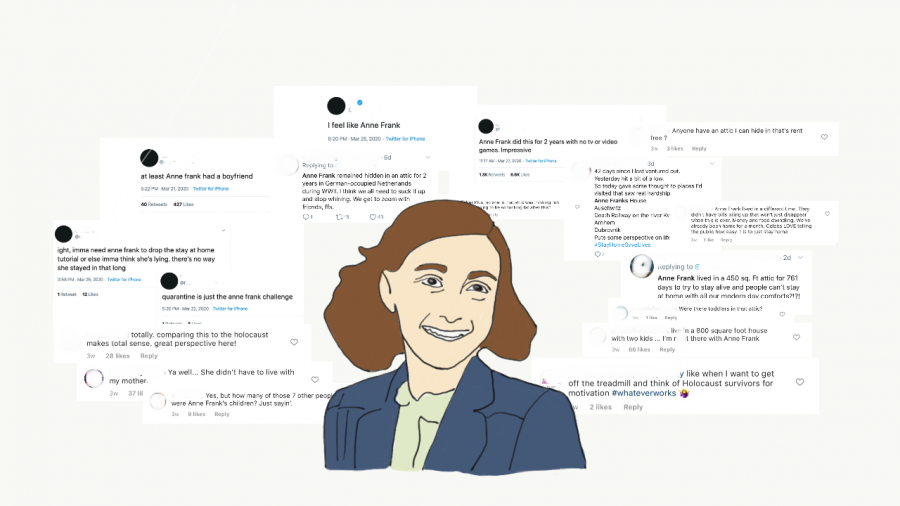Don’t compare your quarantine to the Holocaust
May 1, 2020
Another world crisis, another Holocaust analogy. As the coronavirus continues to keep us inside of our houses and away from people we love, many people are looking for a way to contextualize what is happening, to tell people that the world has gone through much worse and we will make it together. But comparing your quarantine to the Holocaust isn’t the way to do that. With Anne Frank trending on Twitter, it’s time to talk about why these comparisons are not acceptable.
Recently, a common message shared by celebrities and many others on social media has used Anne Frank’s story of hiding as an encouragement to get people to stay home. On Twitter, actor Patton Oswalt commented, “Anne Frank spent 2 years hiding in an attic and we’ve been home for just over a month with Netflix, food delivery, and video games…”, while comedian Chelsea Handler, among many others, shared an image with the words, “To put things in perspective for those of us feeling a bit stir crazy already–Anne Frank and 7 other people hid in a 450 sq. ft. attic for 761 days… We can all do our part to keep everyone safe and spend a few weeks at home.”
While their comments may seem uplifting and a way to help people put things into perspective, what these messages fail to provide is much-needed context. They conveniently happen to leave out exactly why Anne was hiding: because she was a Jewish girl being persecuted by Nazis.
“Coronavirus is an illness that is universal and has the ability to affect everyone, unlike the Holocaust where Anne Frank was specifically targeted for part of her identity,” explains senior Gillian Rosenberg.
The Holocaust was an atrocity created and committed by human beings, while coronavirus didn’t happen intentionally. Anne Frank did not live and die to inspire people to stay in their homes for a few weeks, and using her name and voice as though she did cheapens what happened to her and so many others.
If you can believe it, the posts actually get worse. Some people on Twitter are claiming that they actually understand what Anne went through. Others are claiming that she had it better than they do, making inappropriate and offensive jokes about this serious topic. I’m sure it’s challenging to have kids at home or deal with certain family members right now, but being safe in your home is vastly different than the constant threat of being found out and killed. We are taking strong measures of social distancing to stay safe and protect each other, while Anne Frank ultimately died in a concentration camp. While we can go to essential stores and see our friends and family on Zoom or FaceTime, making one sound during the day could cause the death of Anne’s entire family. Right now, we don’t understand what it could possibly feel like to live in fear at that level. A pandemic is rightfully scary, but it is not the same and should never be compared.
Another strand of Holocaust comparisons comes from protestors and right-wing advocates arguing that their governors and local politicians are Nazis for implementing stay-at-home orders and claiming that they live in a freedom-less world similar to Nazi Germany.
Graham Ledger, a news anchor for the far right-wing outlet One American News (OAN), posted a clip on his social media after getting a haircut stating, “My hairdresser could be fined and/or arrested for what she’s doing. This is not unlike, of course, what they had to live through during Hitler’s time.”
Comparing living in quarantine to living under Nazi rule is a complete false equivalency, as politicians are taking away some of our rights in the short term to save our lives in the long term, whereas Nazis took away rights to control the population and as a way to end lives. Not being allowed to get a haircut is not the same of being stripped of your basic human rights.
These comparisons are not only false, they are blatantly offensive and disrespectful. They commodify the trauma the Jews and others who were systemically targeted during the Holocaust experienced. The comments mock it as only a joke for Twitter or inspirational quote to get through a boring day. So often the Holocaust is used as the basic measure of bad things: if something is bad, it must be the Holocuast. If someone is bad, they must be a Nazi.
From April 20th-24th, ETHS took time to honor Holocaust Remembrance Week with this website sharing resources, interviews, and videos. Having access to tangible information about this abhorrent piece of history is meaningful, and most importantly, it should force us to remember it, and serve as a constant reminder that it is never okay to minimize the trauma that came and comes with it.
“It was Holocaust Remembrance Day a week ago and I think that even during this pandemic, we can still find ways to express our freedom and remember the Holocaust without comparing it to today,” says Rosenberg.
Although everything we are experiencing now is unprecedented and scary, our contextualization shouldn’t come at the cost of someone else’s pain.








